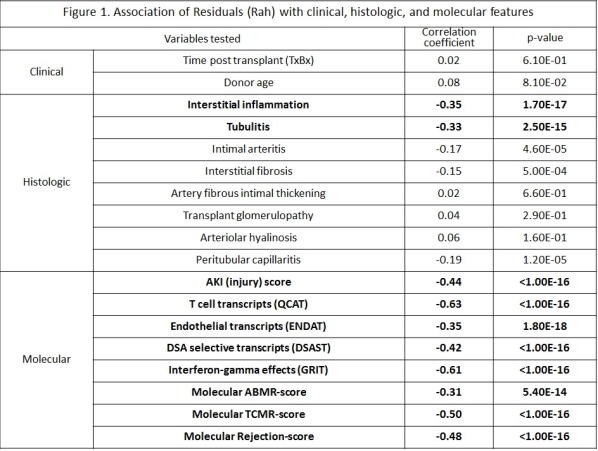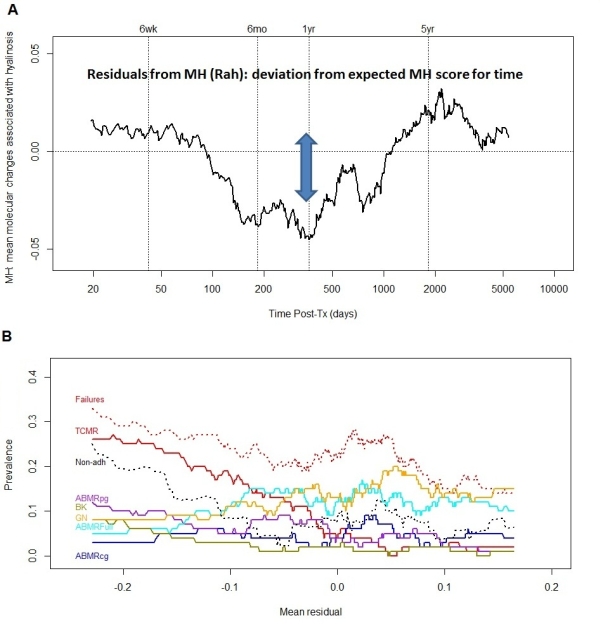A Molecular Biopsy Test for Probability of Non-Adherence.
1ATAGC, Edmonton, AB, Canada
2Hannover Medical School, Hannover, Germany
3Department of Medicine, University of Alberta, Edmonton, AB, Canada.
Meeting: 2016 American Transplant Congress
Abstract number: 413
Keywords: Biopsy, Genomics, Kidney transplantation, Rejection
Session Information
Session Name: Concurrent Session: Kidney Immunosuppression: Novel Agents
Session Type: Concurrent Session
Date: Tuesday, June 14, 2016
Session Time: 2:30pm-4:00pm
 Presentation Time: 2:42pm-2:54pm
Presentation Time: 2:42pm-2:54pm
Location: Veterans Auditorium
Afferent arteriolar hyalinosis (ah-score) in renal transplant biopsies increases with time of biopsy-post-transplant (TxBx), reflecting calcineurin inhibitor drug effects, donor aging, and progressive glomerular diseases. We hypothesized that ah-lesions and TxBx might be used to discover molecular changes related to hyalinosis (“drug effect”), and that levels lower than expected might indicate non-adherence. In renal transplant indication biopsies from 528 patients, 3 days to 35 years post transplant, we developed a classifier reflecting molecular changes related to the ah-lesions and TxBx: the “Molecular Hyalinosis-associated changes” (MH score). The MH classifier did not find molecular changes induced directly by CNI drugs: instead it identified rejection molecules. We calculated the degree to which a biopsy had less than expected MH for TxBx– the “Residual score” (Rah), as a potential estimate of under-immunosuppression. Residuals strongly correlated with histologic and molecular rejection  . Biopsies with strong RahS occurred in the first five years when non-adherence was common
. Biopsies with strong RahS occurred in the first five years when non-adherence was common  , mainly showing TCMR or ABMR without cg lesions (“pgABMR”)
, mainly showing TCMR or ABMR without cg lesions (“pgABMR”)  . In a subset of patients with medical records available for review, non-adherence was frequent in patients with strong residuals. However, many biopsies with ABMR and cg-lesions did NOT have large negative residuals. We conclude that identification of indication biopsies with large negative residuals, using molecular equations trained on ah-lesions and TxBx, is correlated with the probability that rejection is due to under-immunosuppression/non-adherence, which cannot be estimated directly from ah lesions. The results indicate that many TCMR and pgABMR biopsies in the first years post transplant reflect non-adherence, but many ABMR with cg-lesions do not, especially after 5 years post transplant.
. In a subset of patients with medical records available for review, non-adherence was frequent in patients with strong residuals. However, many biopsies with ABMR and cg-lesions did NOT have large negative residuals. We conclude that identification of indication biopsies with large negative residuals, using molecular equations trained on ah-lesions and TxBx, is correlated with the probability that rejection is due to under-immunosuppression/non-adherence, which cannot be estimated directly from ah lesions. The results indicate that many TCMR and pgABMR biopsies in the first years post transplant reflect non-adherence, but many ABMR with cg-lesions do not, especially after 5 years post transplant.
CITATION INFORMATION: Halloran P, Einecke G, Reeve J. A Molecular Biopsy Test for Probability of Non-Adherence. Am J Transplant. 2016;16 (suppl 3).
To cite this abstract in AMA style:
Halloran P, Einecke G, Reeve J. A Molecular Biopsy Test for Probability of Non-Adherence. [abstract]. Am J Transplant. 2016; 16 (suppl 3). https://atcmeetingabstracts.com/abstract/a-molecular-biopsy-test-for-probability-of-non-adherence/. Accessed February 18, 2026.« Back to 2016 American Transplant Congress
